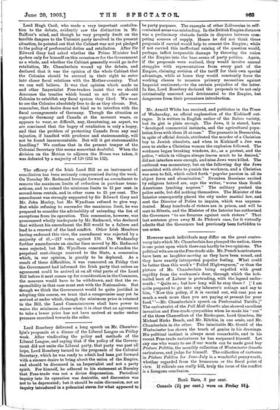The efficacy of the Irish Land Bill as an instrument
of conciliation has been seriously compromised during the week. On Tuesday Mr. Redmond brought forward an amendment to remove the maximum limits of reduction in purchase trans- actions, and to extend the minimum limits to 15 per cent. in second-term rentals, and in other cases to 25 per cent. The amendment was strongly supported by Sir Edward Grey and Mr. John Morley, but Mr. Wyndham refused to give way. But while refusing to surrender the maximum limit, he was prepared to consider the advisability of extending the list of exceptions from its operation. This concession, however, was pronounced wholly inadequate by Mr. Redmond, who declared that without his amendment the Bill would be a failure and lead to a renewal of the land conflict. Other Irish Members having endorsed this view, the amendment was rejected by a majority of 41,-217 votes against 176. On Wednesday further amendments on similar lines moved by Dlr. Redmond were rejected, but Mr. Wyndham consented to abandon the perpetual rent-charge reserved to the State, a concession which, in our opinion, is greatly to be deplore& As a result of these difficulties, it was rumoured on Friday that the Government had informed the Irish party that unless an agreement could be arrived at on all vital parts of the Land Bill before it next comes up for consideration in the Commons, the measure would have to be withdrawn, and that the re- sponsibility in that case must rest with the Nationalists. But though we think the Government would be quite justified in adopting this course, we trust that a compromise may yet be arrived at under which, though the minimum price is retained in the Bill, the • Land Commissioners shall have power to waive the minimum clause when it is clear that an agreement to take a lower price has not been arrived at under undue pressure exercised towards the seller.










































 Previous page
Previous page